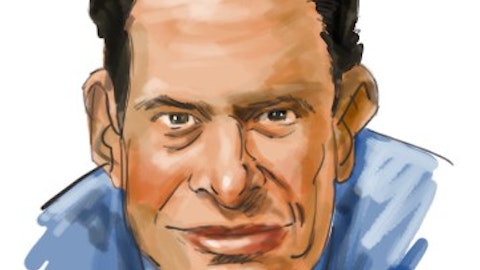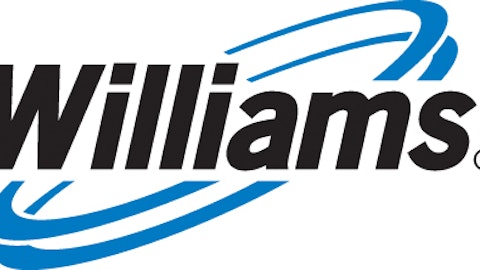David Einhorn is one of most famous hedge fund managers around. One of the reasons why David Einhorn is so famous is his call about Lehman Brothers long before its bankruptcy. David Einhorn gave that speech in 2008 at the Ira Sohn Conference. In this year’s conference David Einhorn talked mainly about Microsoft. Insider Monkey, your source for free hedge fund holdings for more than 300 hedge funds, transcribed David Einhorn’s speech at the Ira Sohn Conference. You can use it as you please as long as you link back to this article. Here is David Einhorn‘s great speech:

Two Longs, Two Different Types of Overhangs
A few years ago, I spoke here and had Carl Icahn speaking after me, and that didn’t go too well. And then last year, I’m told that I had the worst choices in the whole thing. And so I wondered if I should come back this year, and I realized that the conference gets bigger every year. They’ve expanded the speaker list. So it’s going to be harder for me to have the worst ideas this year.
The title today is Two Longs, Two Different Types of Overhangs. And this is the disclaimer. I’m going to lead off with what I think is the macro quote of the year. It comes from Luxembourg Prime Minister, and head of euro zone group of finance ministers, Jean-Claude Juncker who said last month,
“When it becomes serious you have to lie.”
Now when I read this flashing light directive to buy more gold, it struck me that Juncker’s comment is probably about as honest as anything we’ve heard from a politician since the economic crisis began. Juncker, who is one of the currency union’s key spokesmen, explained that lying was needed in order to avoid fueling speculation in financial markets.
So apparently authorities believe that spreading knowingly false information with the intent of manipulating asset prices is acceptable behavior, when it is done by the authorities and the matter is deemed serious. Seriously!
This just confirms the view that whenever someone in charge of economic policy insists that everything is okay, one should question if their sincerity is akin to that of the cockpit crew in the movie Airplane!
[David Einhorn shows a movie clip from the movie Airplane]
Does anyone else notice that Julie Hagerty looks a bit like Ben Bernanke? Alright that’s my macro analysis for today. Let’s move onto a long idea, Delta Lloyd, which is the name of a Dutch insurer and should not be confused with delta of Lloyd, which Investopedia defines as the difference between the golden CEO’s pay, and what the Fed thinks he should be paid.
The basics of Delta Lloyd is a Dutch financial services company listed in Amsterdam and operating mainly in the Netherlands and Belgium. The Bloomberg ticker is DLNA. It has 167M shares outstanding and trades at 70% book value, 6x earnings, and has a 6% dividend yield. Delta Lloyd reports embedded value, which is essentially the discounted value of the existing book of business. At 32 € per share, it means the shares essentially trade at half the runoff value of the company assuming it writes no new business.
Delta Lloyd has over 40B€ of its own risk assets and manages over 70B€ funds in total. It’s primarily a life and pensions business, with about 30% of operating earners coming from the property casualty insurance asset management in banking.
While S&P only rates the group single pay, its insurance entities hold on average 2.3 times the amount of capital required by the regulator at the subsidiary level and 40% more than Delta Lloyd’s own minimum target. Delta Lloyd has only 15% net to equity versus peers typically having 2-3 times as much. Delta Lloyd’s strong capital position and focus on the long-term pension business enables it to take a bit more investment risk than others.
Unlike many other life insurance companies, Delta Lloyd shareholders, rather than policy holders, get to keep any excess investment profits beyond the explicit policy holder liabilities. This is entirely appropriate given the 20-year duration of the liabilities. In practice, this means that Delta Lloyd invests about 80% of its assets in traditional fixed income and 20% of its assets in real estate and equities.
During the recent downturn, Delta Lloyd did a superior job at managing risk, and it was the only major Dutch financial services group that did not require a bail out from the state. Delta Lloyd employs good risk management practices that is a book of defensive equities of 4% dividend yield and low double-digit multiple of earnings. The fixed-income portfolio has minimum exposure to southern Europe or Ireland- they avoided trouble in the European periphery well before others realized the risk.
In 2010, Delta Lloyd out-performed its investment expectations by 120 basis points. It might not sound like much, but that generated over 1 year of additional earnings, which totaled 3.75€ per share, giving the stock value today a PE of less than 5.
We don’t need to assume that started out performance going forward in order to like the shares. We assume a little less than a 5.5% return for Delta Lloyd to earn 2.55 this year. Every 1% move in its equity portfolio adds .20€ per share to earnings. Delta Lloyd manages the downside risk in routine purchases of out of the money puts.
I think that the main reason the shares were available at probably less than half what they are worth is that Aviva, the former parent still owns 43% of the company and everyone knows it’s a seller. We along with our investment banker called Aviva earlier this year and expressed an interest in buying all the remaining stock. We were surprised when instead they announced an accelerated book build and sold 25M shares to Goldman and Morgan Stanley at more than a 12% discount to the market.
They still hold 43% of the company which continues to be in overhang. The stock seems to be poorly placed as the stock now trades below the placement price. Aviva didn’t return our investment bankers’ follow up calls, so we don’t know why they prefer to sell stock so sloppily and at such a discount. Delta Lloyd has a solid management team and is well positioned. I believe the stock is quite attractive and overly discounts the overhang, which we would love to help eliminate. We remain interested in buying or helping Aviva place the remaining stake, and would pay at least the current market price to do so.
But before I get to my second idea, I would like to note that we had so many good ideas we sort of arm wrestled this over the office. And so we actually have a third idea that we’re posting today after the conference on the Value Investors Club website, so that will be a little extra bonus for everybody.
David Einhorn’s Speech About Microsoft
But let’s in the meantime, close out by going back and revisiting my idea from five years ago, which was to buy Microsoft. Many of you will remember that at that time, I argued that Microsoft was the stock market equivalent of A-Rod, the best player of baseball in his prime. I argued that the stock was a bargain because it had a great market position, great prospects, and was available at the league average for a market multiple.
So let’s see what’s happened to that recommendation. First, from an operating perspective, Microsoft has made clear progress. Revenues, profits and earnings have all grown at a decent rate. Microsoft has also repurchased enough stock to make a noticeable impact on the share count. Earnings per share have more than doubled.
Looking at it by segment, four of the segments have shown growth and improvement, the servers and tools growing the fastest. Windows 7 is the fastest selling operating system in the company’s history, with 350M licenses sold and still has the opportunity with a large portion of the installed PC base yet to upgrade. Office products are now used by about 1B people. Newer offerings like Dynamics and SharePoint have consistently grown at double-digit rates, and Window’s share in the server market has also grown from 65-70%, according to Gartner.
Entertainment and devices driven by X-Box and X-Box live has turned from an operating loss to over $1B in operating profits. On the other hand, online services segment has grown mostly in the size of its losses as Microsoft has increased spending on search in an expensive effort to belatedly take on Google.
Five years ago we thought Microsoft could become the dominant provider for software for smart phones and could displace research in motion. We were right that RIM would be displaced, but it has been Apple and now Google Android that has done the job. Microsoft has one more shot at a role in smart phone software through its deployment on Nokia phones. Nokia is still the global market share leader in cell phones. Maybe it will work out, but this is hard to envision great success in the area coming on the heels of so much disappointment in missed opportunity in this important and visible category.
Certainly success is not linked into the stock price.
Microsoft’s business has been much stronger than the average company in the S&P over the last 5 years. Revenues have grown nearly 4 times faster at Microsoft, EPS has more than doubled, while S&P’s have grown only a few percent. Microsoft has also almost doubled its dividends.
While I thought Microsoft was a bargain at a small discount to the S&P, it now trades at a remarkable discount.
Even as the business is out performing average S&P 500 companies by a wide margin, the advancement has been barely above average. While the S&P multiple has gone from 16 to 15, Microsoft’s multiple, net of cash, has contracted from 16 to 7. The question at hand is why. Certainly Microsoft isn’t getting credit for some of its achievements and prospects.
Today cloud computing companies that make no profits trade at 10x revenue. In April, Computer Reseller News named Microsoft the cloud computing applications champion ahead of Salesforce.com. And now with the rollout of Office 365, Microsoft is positioned to be the leading software service company in the world.
Separately Microsoft has a strong position in application hosting, making Microsoft uniquely positioned to lead in both revenue areas in cloud computing. Morgan Stanley estimates that Microsoft already has $5B in software as a service in cloud revenues, making it roughly 2.5x larger in this segment than SalesForce.com
Microsoft has made some other good innovations. Kinect is a terrific product with capabilities that should go far beyond video games. SharePoint looks like another significant opportunity to win content management systems, document management systems, and collaboration.
One could make the argument that Windows Office franchises face bigger risks. Five years ago, the worry was about open source software. Some suggested that Microsoft might have to give away Office in order to compete with Google free offering. Those fears were grounded in reality at the time, though they now appear to have been overblown. Google docs has captured less than 1% of the Enterprise market. Today the worries that tablets are taking share from PCs and notebooks. Time will tell whether that concern will prove problematic or whether Microsoft has a good response.
But I think that the bigger problem is that I got the analogy wrong. Microsoft is not A-Rod. The better analogy is that the best parts of the Microsoft product portfolio, particularly the dominant Windows Office and Enterprise server franchises, are A-Rod. Put simply, they are some of the most valuable products ever developed in technology. They are record-setters and hall of famers. But they are only part, albeit a large part, of Microsoft. And having A-Rod by himself does not win championships.
Before the 2001 season, the Texas Rangers signed A-Rod to a record 10-year $250M contract. He spent the three years in Texas and did not disappoint, hitting 156 homers and batting over .300, but the team never won more than 73 games, and the Rangers management and overall resource allocation decisions were more Charlie Brown than Sandy Alderson.
That’s not only precluded them from winning despite A-Rod’s heroism, it eventually pushed them into bankruptcy. Now Microsoft suffers from Charlie Brown management, as evidenced by its miserable capital allocation plan. It makes no sense to invest the terrific cash flows in pricey acquisitions, losing businesses, and mostly unproductive R&D, particularly in a corporate culture where even when the team does develop a product, Microsoft is unlikely to bring it to market if it conflicts with Windows.
David Einhorn Says Steve Ballmer Must Go
In the five years since I first spoke about Microsoft, the most common question I’m asked is what about Ballmer? My initial reaction was to say Ballmer does not care what Wall Street thinks, and maybe that’s a good thing. Wall Street has lots of bad ideas, and people can get rich by ignoring them. It’s more important that he does a good job running the company.
But having now owned Microsoft for half a decade, and having watched the company carefully, I can say that the problem with Ballmer isn’t his attitude toward Wall Street. While the financial results have been good compared to other companies, I believe this reflects an incredibly strong market position that Ballmer inherited rather than his skill as a manager.
Ballmer’s problem is that he is stuck in the past, and is at best a caretaker in an industry demanding constant innovation. He’s allowed competitors to beat Microsoft in huge areas including search, mobile communication software, tablet computing, and social networking. But even worse, his response to these failures has been to pour tremendous resources into efforts to either buy or develop his way out of these holes.
The best example of this behavior was his 2008 attempt to throw several years of Microsoft profits into premium priced purchases deteriorating Yahoo! business. Here Microsoft was only saved by Yahoo!’s then management, which proved by to be even crazier by rebuffing the offer. But the risk that on any given day we could wake up with the announcement of another bad and very expensive acquisition has an ongoing dampening impact on Microsoft’s PE ratio.
For another example, let’s consider this quote from a 2006 interview with Fortune [David Einhorn Reading].
Q: “Do you have an iPad?”
A: “No I do not. Nor do my children. I’ve got my kids brainwashed. You don’t use Google and you don’t use an iPod.“
Or this quote from a 2007 interview in USA Today:
“People get passionate when Apple comes out with something new. The iPhone of course, the iPad, the iPod. Is that something you’d like people to feel about Microsoft?”
Ballmer says, “It’s sort of a funny question. Would I trade 96% of the market for 4% of the market?” And he laughs to himself. “I want to have products that appeal to everybody. There’s no chance that the iPhone is going to get any significant market share, no chance. It’s a $500 subsidized item. They make a lot of money. But if you actually take a look, the 1.3B that get sold, I prefer to have software in 60% or 70% or 80% of them. I’d rather have that than the 2-3%, which is what Apple might get.”
Now the Pincher came for me in a Fortune article this March. It began with a description of what happened to Microsoft’s development of a tablet computer that they called the Courier. According to Fortune, the Microsoft team working on Courier was equally jazzed.
“We had a breakout product that had the potential to really delight the user,” says Rebecca Norlander, a star programmer inside Microsoft who quit last June after 19 years with the company.
So when Robbie Bach, who led the company’s entertainment and devices division at the time, presented his idea to CEO Steve Ballmer and Microsoft’s senior leadership, he expected enthusiasm and additional funding for the project. There was just one problem: The Courier prototype borrowed from Windows, Microsoft’s vaunted computer operating systems, but had an operating system all its own.
Bach learned the hard lesson about the power of Windows within Microsoft. Not only would Bach not receive the extra funding he sought, said Ballmer, who personally delivered the blow, but there would be no Courier because it was unnecessary
Every year Microsoft invests $9B in shareholder money and R&D. Much of it is wasted on product that will never see the daylight, or worse, is spent on products like the Kin, which was pulled from the market after just 48 days.
But a good chunk of that goes to developing future generations of Windows and Office. Perhaps if Ballmer eased up on brainwashing and let his kids play with the most popular devices, he would see the opportunity in making available a version of Office for the iPad and the Android devices.
The search business is another sinkhole. On pace to generate $2.5B or more in operating losses this fiscal year, the sixth year of operating losses. Even for Microsoft, these losses at 25% per share, matter, especially when the losses are growing over time. (David Einhorn exceeds the allocated time and says “I’m going to use Bill Ackman’s 2.5 minutes.”)
Microsoft’s dogged determination to be successful in this field by investing as much money as necessary for as long as necessary is a result of having the high margins of Windows and Office to subsidize the losses. At the very least it’s time for Microsoft to consider strategic alternatives for its search business.
One possibility would be to strengthen the existing strategic relationship it has with Facebook, where my cousin Sheryl has worked as the COO since 2008. Since search is a scale business, and scale comes from traffic, currently Microsoft spends heavily to drive users to Bing. Facebook could help Bing achieve scale and reduce Microsoft’s need to pay for traffic.
Likewise, paid search at scale is one of the most proven high margin businesses on the internet. Microsoft could help Facebook with one of the biggest challenges, namely monetizing its traffic without reducing the user’s experience. It’s obvious that Microsoft needs traffic and Facebook needs search. As the cost to create a new search engine of its own is prohibitive, the revenues paid search through Bing would be capitalized in a much higher multiple on Facebook’s income statement than on Microsoft’s.
With the JV, or perhaps even an outright sale, Microsoft can contribute Bing in exchange for a sizeable minority interest in Facebook. This would be a win-win for both companies and their customers.
But for my final thoughts on Microsoft’s future, I’d like to revisit one last Ballmer interview from Business Week in 2005. In it he says [David Einhorn Reading]
Great companies and the way they work start with great leaders. You have to say, do you have great leaders? All companies of any size have to continue to push to make sure they get the right leaders, the right team, the right people to be fast-acting and fast-moving in the marketplace. We’ve got great leaders, and we continue to add and attract and promote great new leaders. And he later added, we’ve bought on fantastic new talent, people like Ray Ozzie, Gary Flake, and Li Gong.
Well Ray Ozzie, Gary Flake and Li Gong have all left Microsoft, along with Robbie Bach, and J Allard, who were largely responsible for the success of X-Box. Four other division presidents have left Microsoft since 2008 as well as former CFO Chris Liddell. Good grief!
Perhaps the question is not do you have great leaders, but rather do you have a great leader?
During my freshman year at Cornell, I joined my dorm’s intramural football team. At the first practice, upper classmen pointed out I was tall, so I should try playing QB. Well half an hour later, it was abundantly clear that I should not be the QB. I remember how kind the upper classman was when he said, David, we’ve seen what you can do, let’s give so-and-so a chance.
As I recall, Charlie Brown had about as much success on the baseball field as he did with Lucy and her football. I think it’s fair to say that almost everyone except Steve Ballmer understands it’s time for Microsoft’s board to tell Steve Ballmer after ten years as CEO, alright, we’ve seen what you can do. Let’s give so-and-so a chance.
This continued presence is the biggest overhang on Microsoft’s stock. Thank you.
[applause]
Oh wait, one more thing I have to say. LET”S GO METS!
David Einhorn Articles:
Transcript of Bill Ackman’s Speech at the Ira Sohn Conference
Interview with Marc Faber at the Ira Sohn Conference
David Einhorn Favorite Long Pick of 2011
David Einhorn and Dan Lob in Reinsurance Business
David Einhorn and Greenlight Capital’s New Stock Purchases and Portfolio
David Einhorn Investment Style
This is How David Einhorn Shorts Stocks
David Einhorn and Greenlight Capital’s Investor Letter Q2 2011
David Einhorn: Big Banks Pickpocket Pension Funds
David Einhorn’s New Stock Picks
Warren Buffett and David Einhorn
David Einhorn is Bullish About Seagate
David Einhorn and Greenlight Capital’s Returns
You can always check what David Einhorn has in his portfolio here at Insider Monkey. Here are the stocks David Einhorn added to his portfolio recently.




